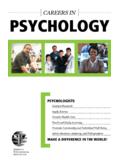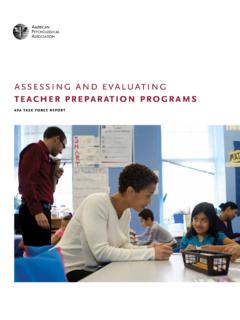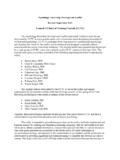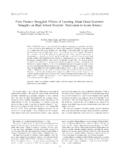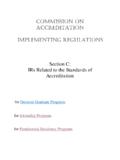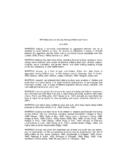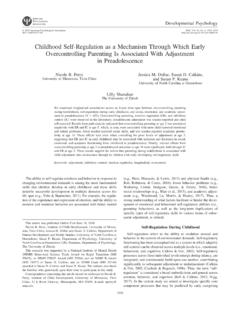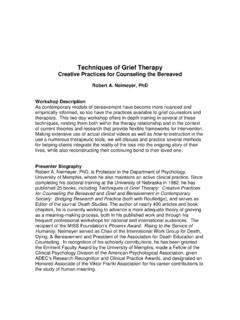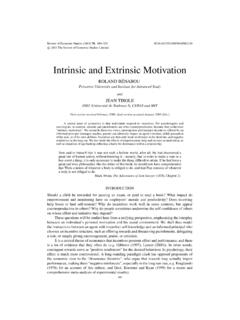Transcription of Psychology and Global Climate Change
1 1 Psychology and Global Climate Change : Addressing a Multi-faceted Phenomenon and Set of Challenges A Report by the American Psychological Association s Task Force on the Interface Between Psychology and Global Climate Change Members Janet Swim, PhD, Chair Pennsylvania State University Susan Clayton, PhD College of Wooster Thomas Doherty, PsyD Sustainable Self, LLC Robert Gifford, PhD University of Victoria George Howard, PhD University of Notre Dame Joseph Reser, PhD Griffith University Paul Stern, PhD National Academies of Science Elke Weber.
2 PhD Columbia University This report is available online at the APA website 2 TABLE OF CONTENTS Executive Summary 6 Preface 12 Introduction 17 Addressing Climate Change : Psychology s contribution Mobilizing the diverse field of Psychology to address Climate Change Background information Fundamentals of Climate Change Human dimensions of Climate Change Psychological dimensions of Climate Change Literature review Section 1: How Do People Understand The Risks Imposed By Climate Change ?
3 33 Detection of Climate Change Concern about Climate Change (Not) feeling at risk Discounting the future and the remote The role of culture in Climate Change understanding and reactions Research suggestions Summary Section 2: What are the human behavioral contributions to Climate Change 50 and the psychological and contextual drivers of these contributions? Ethical concerns Overview Quantitative models Population Consumption Types of consumption behaviors Individual drivers of consumption Context and consumption Counter-consumerism movements
4 Research suggestions 3 From causes to impacts Section 3: What are the psychosocial impacts of Climate Change ? 77 Psychosocial and mental health impacts of Climate Change Mental health issues associated with natural and technological disasters Stress and emotional outcomes associated with natural and technological disasters Lessons from Hurricane Katrina Differentiating between normal and pathological worry regarding Climate Change Uncertainty and despair Research on Climate Change -related emotions Numbness or apathy Guilt regarding environmental issues Social and community impacts of Climate Change Heat and violence
5 Intergroup relations Displacement and relocation Reactions to socioeconomic disparities Social justice implications Moderators of Climate Change impacts Proximity Vulnerabilities and resilience Social norms Psychosocial mediators of Climate Change impacts Relative risk appraisals Mental models Media representations Anxiety Global Climate Change in context of other environmental challenges Psychological benefits associated with responding to Climate Change Research on psychosocial impacts of Climate Change The relationship between psychosocial impacts and coping Section 4.
6 How do People Adapt to and Cope with the Perceived Threat 97 4 and Unfolding Impacts of Climate Change ? Climate Change threat and environmental impacts as stressors Types of stressors Natural and technological disasters Mediating relations between stressors and coping responses Threat appraisals Coping appraisals Attributions Affective responses Motivational processes Types of coping responses
7 Moderators of coping process Interventions Summary Research recommendations From adaptation to mitigation Section 5: Which Psychological Barriers Limit Climate Change Action? 123 General sequence of psychological barriers Ignorance Uncertainty Mistrust and reactance Denial Judgmental discounting Place attachment Habit Perceived behavioral control Perceived risks from behavioral Change
8 Tokenism and the rebound effect Social comparison, norms, conformity, and perceived equity Conflicting goals and aspirations Belief in solutions outside of human control 5 Summary Research suggestions From barriers to Change
9 Section 6: How Can psychologists Assist in Limiting Climate Change ? 136 What Psychology can contribute Better models of behavior based on empirical analysis Better understanding of individuals and households Evaluation methods What Psychology has learned Determinants of environmentally significant consumption Variations in environmentally significant behaviors Responses
10 To interventions Organizational, policy, and cultural Change What can Psychology do to be helpful? Developing behavioral understanding of ESBs Developing and testing interventions to limit Climate Change Working with others Summary and Discussion 155 Psychological approach to studying Climate Change
